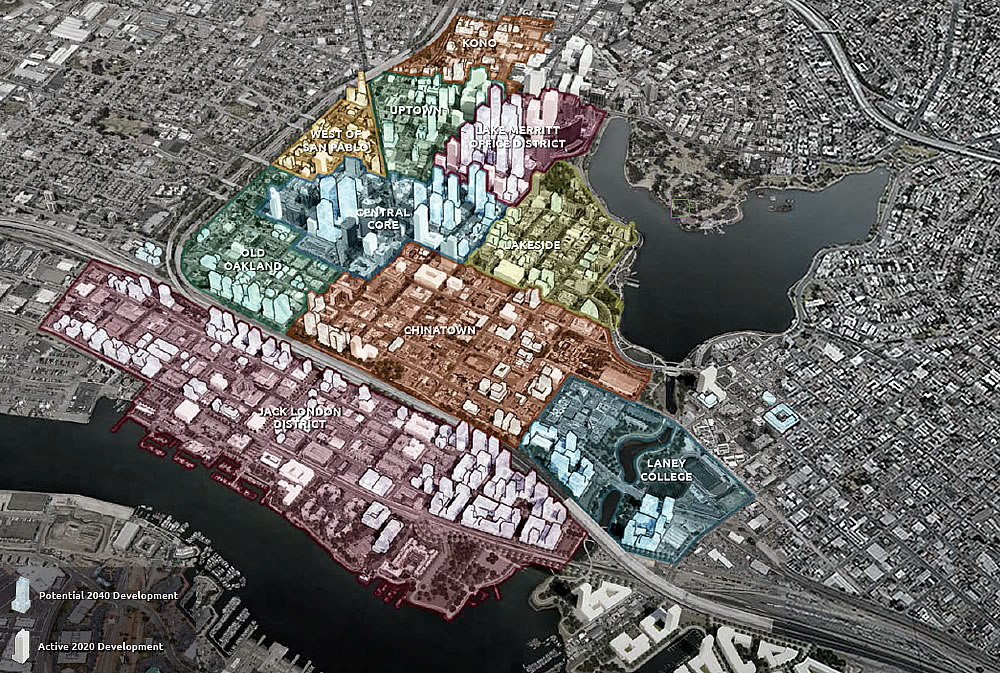Having ticked up a couple percent in February, the average asking rent in Oakland slipped a percent in March to $2,600 per month. As such, while the average asking rent in Oakland is 6 percent higher than at the same time last year, it’s still 3 percent below its pre-Covid mark and 13 percent below its 2016-era peak, versus 12 percent lower than prior to the pandemic in San Francisco, which is 18 percent below San Francisco’s 2015-era peak.
As such, the relative discount in asking rents between Oakland and San Francisco, which had dropped from around 34 percent prior to the pandemic to 24 percent in the first quarter of 2021, has ticked back up to 28 percent, with the average asking rent for a one-bedroom apartment in Oakland currently running around $2,200 a month versus closer to $3,000 in San Francisco.
Our analysis of the rental market in San Francisco and Oakland is based on over 200,000 data points going back two decades, not just a few years, that we maintain, normalize and index on a monthly basis. We’ll keep you posted and plugged-in.

While the land may be cheaper in Oakland vs SF, if prices continue to be around 30% cheaper and politicians remain stubborn about affordable housing requirements (likely), Oakland has a tough road ahead in terms of building housing. Apparently a high affordable housing request (above the legal minimum of 15%) is holding up the A’s Howard Terminal project.
I could see a world where, politically, SF revises its requirements to make projects pencil, and The City gets tough on crime and pro-business. I find it much harder to see Oakland adapt. I think things could get ugly in Oakland over the next 5-10 years.
Yes, if SF suddenly reverses course and does a complete 180 on every single one of its core policies, then Oakland will be in trouble. Aside from this fantasy I think Oakland is in relatively little danger.
All of the points I made are currently under discussion.
– On “making projects pencil,” NIMBY Aaron Peskin himself admitted last month that it’s a math problem to get housing built and affordable housing requirements are a problem in that math.
– On “tough on crime,” the new DA and new Supe in D6 are certainly more pro-enforcement than their last two predecessors. “Defund the Police” Supe Ronen was very dramatic recently about the need for police.
– On “pro-business,” on two weeks ago “Mayor Breed’s legislative proposal entails over 100 changes in the Planning Code to facilitate easier permitting for small businesses, encourage economic recovery and growth, and fill commercial vacancies in San Francisco.”
I don’t expect major change in the next 12 months, but I do sense a change in the tide.
The City gets tough on crime
Opportunity has knocked: San Francisco homicide: Tech exec stabbed in Rincon Hill. Oakland, of course has no shortage of homicides, but it does have far fewer execs who can be victims.
As many had suspected, despite a chorus of “luminaries” that co-opted his death, Bob Lee’s killing wasn’t random. And in fact, the killer appears to have been another tech exec and associate from Emeryville.
Indeed: the “I told you so’s” are already flying. But before everyone joins the Chamber of Commerce in a sigh of relief, they might pay heed to the preface to the apologetic part: San Francisco is home to much in the way of visible public misery, unnerving street behavior and overt drug use. Its property crime rate has long been high, and the police clearance rate for property crimes has long been minimal.
The last sentence of the paragraph that you otherwise quoted in full appears to have been accidentally truncated: “But the city’s violent crime rate is at a near-historic low, and is lower than most mid-to-large-sized cities.”
Not accidentally: I did mention “the apologetic part” 🙂 The point being, of course, not to use the latter to ignore the former.
As for the validity of the claim, specifically, or Mr. Eskenazi’s staunch defense of the ‘status quo’, more generally: it depends a lot on how far back in history you go (talk about truncating!): yes, things look good compared to the past 25 years, but not so much compared to the 1950’s or early 60’s. Other cities? Well, yes, against all other cities; but SF has very favorable ethnic and economic demographics (“favorable” in the sense of lower crime). A comparison against peer cities like Honolulu, Denver or San Diego might be much less encouraging.
Oakland is weird about housing. That 2040 plan, for instance, leaves numerous derelict blocks in Chinatown untouched. Redevelop that stuff. We need housing and less blighted, boarded-up storefronts.
Actually John Fisher’s attempt to get other people to pay for things is holding up the the HT project, aside from the basic problem of being a megalomanical overkill (I mean there are literally Billions of dollars of the much touted $12B Project unexplained).
As for what you see SF doing,…. I see a lot of lively discussion about that.